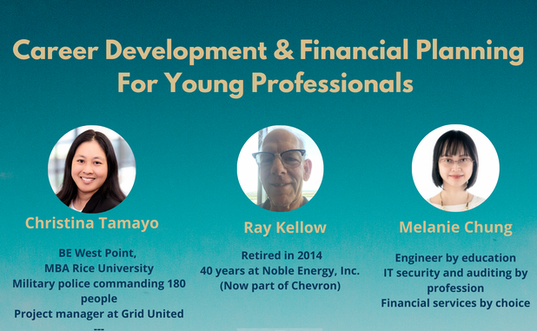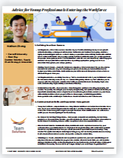|
We had a very successful event on Sunday. Thanks to the 3 great speakers and the audience who showed up in person or on Zoom.
Download Nathan's advice (PDF) About the author - Nathan Zheng Cornell University, Bachelor's of Engineer Best Buy Decision Scientist- Supply Chain strategy & Innovation 1. Defining Your Own Success
a. Setting Goals – What does success look like to you? Is it maintaining steady career growth while maintaining a strong work-life balance for friends and hobbies? Is it going all-in for a highly demanding job to make as much money as possible and sacrificing short-term comfort for an earlier retirement? Do you enjoy solving technical problems or do you want to go down the people management track? Your definition of a rich-life can change and most likely will change, however, you should think about what your rich-life looks like. This will allow you to set appropriate goals and have conviction along your own unique journey. b. Finding Your Balance – Work-life balance is subjective. What is balanced for you may not be balanced for someone else, but knowing your goals will enable you to determine how to budget your time and efforts. Don’t compare your differences in lifestyle to others who have different life goals than you. c. Setting Boundaries – Learning how to say “no” is an underrated skill. If your definition of work-life balance is clocking out each day at a certain time, being able to say “no” will allow you to keep up with the after-work activities that fulfill you. No matter if you work 40-hour or 80-hour weeks, being able to say “no” will allow you to focus more efficiently on delivering high-visibility work and developing high-value skills that will elevate your career. d. Maintain Your Health – Your career is a marathon, not a sprint. Eat healthy, sleep right, and exercise frequently. Investing in your own physical, mental, and spiritual health will enable you to perform consistently and at a higher level. Nevertheless, marathons are not easy and there will certainly be times where you get off track. However, by establishing good time management skills and lifestyle habits these should become few and far between. 2. Communication Skills and Reputation Management - a. Trust, but Validate – Reputation takes a long time to build but can be lost in an instant. Make sure any of your work being presented externally is pristine. Trusting other team members to assist work is necessary, however, it is your job to ensure their contributions are validated as well if you are the one signing off on the delivery. b. Be Known for Getting Things Done – Most people can point out problems, but not many people have the ownership to come up with solutions. Be known as the person who comes to leadership with solutions, and you will be sought out when new opportunities arise. c. Directed and Concise Communication – Communicate in a style best received by your audience. How you communicate in a high-level strategic meeting with senior management should be very different than how you would present an operational update during a daily scrum. This applies not only to content, but tone, pace, and vocabulary. Conciseness is crucial, especially when e-mailing partners and stakeholders. It will ensure others deliver exactly what you’re asking for and on-time (long e-mails get read last). d. Winning as a Team – Document and keep others updated on your own work/findings. Not only does this create visibility for you, but also enables others to learn from you and become stronger members of the team. Slowing down to teach others may be frustrating at times, but remember the quote, “if you want to go fast, go alone; if you want to go far, go together.” 3. Actively Seek Constructive Feedback a. Handle Your Ego – As a newly minted graduate, you may be eager to finally show off all the skills you’ve learned through schooling and be a driver for change. While this can-do attitude is highly valuable in the workplace, there are many other skills that determine success at work not taught in formal education that you may or may not have fully developed. Be open to receiving feedback as an opportunity to improve on your weaknesses, not as a slight of your many strengths. b. Take Charge – In an ideal world, our leaders have our career advancement in their best interests. However, never let something this important be left to chance. Be clear in what your goals are and work with your leader to create a development plan. Then, be proactive in reviewing that development plan on a regular basis to track progress and areas of improvement. c. Manage Up – Like you, your manager will also have their strengths and weaknesses. Being able to provide constructive feedback to your manager and work with them to improve allows the whole team to deliver more effectively and shows your ability to take responsibility. 4. Network Internally and Externally a. Be Open to New Opportunities – Even if you’re not actively looking for jobs, keep your LinkedIn updated! You never know when an amazing opportunity may present itself that can accelerate your career. Additionally, interviewing is a skill. You can keep interviewing for practice and ensure your skills and compensation are competitive with the market. b. Don’t Sell Yourself Short – Many people, especially women, are hesitant to apply to job listings that “require” more years of experience or specific skills than they currently have. Don’t be afraid to apply to jobs where you might feel underqualified! Companies rarely find candidates that tick all the boxes you might be missing an opportunity to accelerate your career. c. Champion Your Work – Take opportunities to present your work beyond what is required. Whether informally through coffee chats or spotlight sessions with the broader organization, the more you publicize your work the more partnerships and potential opportunities and you create for yourself. d. Learn from Everybody – You can learn as much from the senior analyst who has been at the company for over 30 years as the head of the department. You can learn high-level strategy from the director, but from the senior analyst you can learn the history of the business witnessed firsthand and understand working dynamic with nearly everyone you meet. If you are on their good side, their introductions may enable you to collaborate more efficiently and accelerate your learning.
拜登政府8月24日宣布了一项历史性的学生贷款减免计划。 很多人争论这项政策不公平,对那些辛苦工作,拼命给孩子存学费,为了孩子不背负贷款甚至不惜牺牲自己的退休金的家长不公平;对那些毕业后不敢娱乐消费,不敢买房,努力还清了贷款的孩子不公平;更对那些因大学学费太贵,放弃了大学教育,已参加工作的蓝领纳税人不公平。 但是,不管我们的政治立场如何,或者对这项政策的态度如何,它已经生效了,马上就要实施了。 所以我们现在能做的就是研究它,尽量拿到属于我们的好处。 在等飞机的闲暇中,看了一些文章,现把我 笔记分享一下,希望可以帮到一些人。 ---------------------- 拜登学生贷款减免计划主要内容 (Student Loan Relief Plan) 来源:Federal Student Aid 官网文章 The Biden-Harris Administration's Student Debt Relief Plan Explained https://studentaid.gov/debt-relief-announcement/ 这个法案有三部分。 1. 再次延长免利息积累、免罚金的优惠到2022年12月31日。 拜登上台后多次允许有联邦学生贷款的人因为疫情暂停支付学生贷款,而不用积累额外利息,不用支付罚金。这次是最后一次延长。也就是说明年一月一日,如果有联邦学生贷款,你将重新开始还贷。 2. 为收入在 $125K(单身) 或 ($250K家庭收入)的人提供免除最多$20,000 联邦学生贷款
关于此项减免的几个关键问题: (以下这些问题和答案的来源于 Money 杂志 8/24日文章 Student Loan Forgiveness: Here's Who Qualifies Under Biden's Plan) Q1: 什么收入? 哪一年的收入? AGI adjusted gross income, 也就是税表上的应税收入。 2020 或者 2021 年度的收入都可以作为申请减免的依据。 Q2: 什么类型的学生贷款符合免除要求? The forgiveness applies to most types of federal loan that were disbursed by June 30, 2022. That covers: Direct loans (subsidized and unsubsidized) for undergraduate students, Direct PLUS loans for graduate students and parent borrowers, and Direct Consolidation loans. Loans that were in default prior to the pandemic forbearance are covered, too. 基本上大部分联邦学生贷款都符合免除条件,包括本科生本人贷的direct loans, 研究生贷的direct plus loan, 学生家长贷的Parent Plus Loan。 不过要求是2022年6月30日前发放的贷款,也就是说你为本学年 (2022年秋季学期)刚刚贷的款不符合条件。 私人机构的贷款不符合减免条件。 Q3: 还没毕业的大学生(还没开始还贷)符合学贷减免条件吗? 是的。因为他们没有收入,采用父母的收入数据。 Q4: 最多能拿到多少减免? 学生如果拿过Pell Grant, 最多可以拿到$20,000 减免, 加上父母贷款的$10.000 减免,一个家庭最多可能拿到 $30,000 学贷减免。 Q5: 如何申请学贷减免?
3. 正在酝酿中的教育部学生贷款偿还优待方案 (New Income-Driven Student Loan Repayment Plan) 拜登政府也正在酝酿为釆用income-driven 还贷方式的人推出更加优惠的条款:
----------------------------- 看完这个法案的细则和拜登政府的在学费问题上的未来方向,你是不是觉得我们华人传统的“无债一身轻”的观念太吃亏了,也许将来咱们在规划孩子学费时也应考虑适度借贷? 其实在学生完成学业后,政府本来就有各种还贷优惠或减免条款,用好了可能比费劲争取奖、助学金省的钱还多。但是贷哪种,谁来贷,怎么还,还是很有讲究的。 如果你想了解更多,欢迎跟我们联系。也欢迎你来听我们的相关讲座。 Our college webinar on the past Saturday was very successful and a lot of people thanked us for the useful information. ( If you want to watch the recording, just click the picture below. ) Watch Webinar Recording In this article, I will address the top 5 most common questions parents asked me about college funding. How do I know if my family's income or assets are too high for financial aid?
Use an EFC calculator and a net price calculator (if your child already has some schools on mind) to run an estimate. Our income is high. Should we still fill in FAFSA and CSS profile forms? 1) Do you think your income is really high? In some schools, NYU, Vanderbilt and U of Southern California for example, because many students are from affluent families, you may not be that rich compared to them. 2) Some organizations may require you to fill in FAFSA and CSS forms to get merit scholarships. 3) If you want to borrow federal student loans, you also need to fill in the forms. 4) What if something happens (fire, major diseases, lay off etc.) in the middle of a school year? At the time a student's family is experiencing a hardship, they can't get financial aid because they have never filed the forms. Will applying for financial aid impact my child's chance to get into his/her dream school? Many top universities are need-blind. If our child has a special talent or has strong profile, colleges will want the student without any hesitation. Then it doesn't matter he/she files financial aid application or not. But if your child is put on the waiting list, colleges usually will consider the affordability of the family. Some schools are need-aware, which means that they will take consideration of the finance of the family. - Below is a response made by a Boston University admissions advisor: The overwhelming majority of our admissions decisions are made without consideration of a student’s financial situation. However, for a very limited number of cases, we are need-aware as one factor. Can my child claim himself as an independent student and therefor get more financial aid? An independent student must meet at least one of the following 10 criteria:
If I form a LLC and let the company hold our rental properties, will we qualify for more financial aid? Unfortunately no. Even though assets owned by your family business currently are not accountable in the FAFSA EFC calculation, your LLC doesn't qualify as a true business if it simply owns the rental properties, unless you also provide maid services and breakfasts on the properties. Also, on the CSS profile form, assets owned by a family business are included in the EFC calculation. In addition, in 2024 when the new FAFSA rules become effective, assets owned by family business will also be included in the FAFSA EFC calculation.
讲座要点:
1. 地产经纪报税时的注意事项及tips
–Advertising – 4.89% –Car Expenses – 8.81% –Commissions – 6.49% –Depreciation – 2.45% –Other Expenses – 10.49% –Business Use of Home – 1.09% –Total Expenses – 54.43% ---------------------- 2. 地产经纪如何省税? 如果收入超过10万, 建议成立LLC, 用公司来从事地产营销 自雇人士很多的benefits 可以抵税: 医疗保险 (如果夫妻双方都没有雇主提供的医疗保险), term insurance, 长期护理保险, 有些学费, 小孩的日托费用 给自己存退休金: 不要用 Traditional IRA: 因为每年最多只能存 $7000, 而且只能减掉收入税 建议用 SIMPLE IRA (如果有雇员) 或者 SEP IRA: 除了减收入税,还可以减社保和Medicare 的税 如果收入很高, 还可以用 defined benefit plan 适用于自雇人士的退休计划比较 (每年投入限制):3. 拜登税改可能给地产行业带来严重影响 拜登政府正在酝酿一系列税改, 有几项跟地产经纪可能有关:
怎么办? 不要把所有的钱放在房子里,可以用其它的投资理财计划! |
Categories
All
Archives
August 2023
|
|



